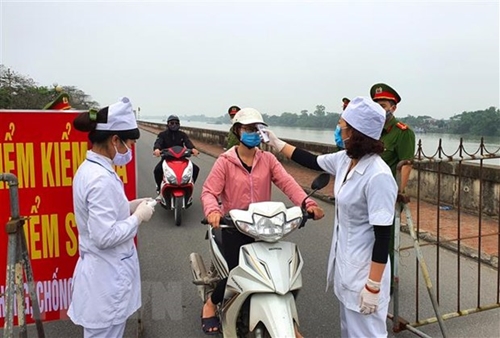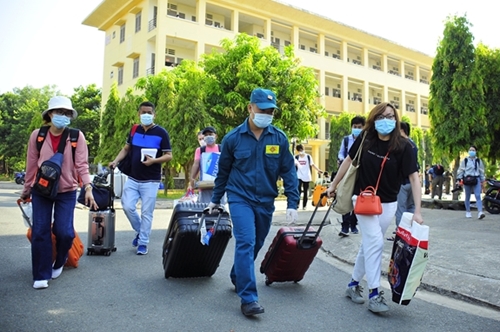The US’s The Strategist newswire said Vietnam has followed a budget-friendly approach that has proven equally effective. The Vietnamese Government tightened border controls and put hospitals and local health departments on high alert before the first fatality in China and only three days after confirmation of the outbreak there.
    |
 |
|
People crossing Dao River in Nam Dinh province have their body temperature measured |
Its recent study of Vietnam’s COVID-19 policy response attributed the country’s initial success in slowing the rate of infection to the authorities’ focus on communication and public education through technology platforms and systematic tracing of pathogen carriers.
The article also noted that citizens have been voluntarily sharing personal health information via a government-launched app called NCOVI while authorities have actively interacted with citizens via the social media.
It concluded that by focusing on early risk assessment, effective communication and government–citizen cooperation, an under-resourced country with a precarious healthcare system can manage the pandemic.
At the same time, the ASEAN Post said other nations in ASEAN and the rest of the world can learn from Vietnam’s swift response to handling the pandemic.
France’s Liberation paper attributed Vietnam’s impressive achievements to the healthcare system’s efforts to ensure the safety and health of the people instead of heeding profits of insurance companies.
About this, Russia’s Novosti Petrozavodsk paper quoted a woman of the country returning from Vietnam as saying that the Vietnamese State has offered all possible support for citizens, always ready with available food, necessities and masks to meet public demand with discounts. Meanwhile, the Vietnamese people fully follow the State rules without hesitance.
The Times of India said the Vietnamese Government has actively protected citizens against the epidemic as it promptly suggested initiatives and understood the exact nature of challenges.
The article stressed that the success could be reached if each citizen hightens the sense of responsibility and cooperates with the government.
The UK’s The Guardian published a poster and post stamps designed by Vietnamese painters that sent clear messages of solidarity in the fight against COVID-19.
Meanwhile, the US’s New York Times said despite insufficient resources and financial capability, Vietnam still sent masks to France, Germany, Italy, Spain and the UK along with its neighbours Cambodia and Laos. Vietnam also handed over 450,000 Dupont protective suits to the US.
German news agency Deutsche Presse-Agentur (DPA) on April 13 underlined that Vietnam's response to the COVID-19 pandemic can offer lessons to nations struggling to contain the outbreak, noting that “much of Vietnam's success can be ascribed to its social unity”.
In an article entitled “No deaths: the world can learn from Vietnam's coronavirus response”, the author noted that despite sharing a long border line with China, Vietnam has, with a combination of early decisive action, extensive testing, vigorous quarantining and social unity, so far avoided the devastation seen in many other places worldwide.
With the number of infections of over 200, Vietnam's response to the crisis has earned praise from the World Health Organisation (WHO).
    |
 |
|
Many people complete 14-day quarantine. Photo: qdnd.vn |
Official statistics show that as of April 13, there had been more than 75,000 people in quarantine. The country has so far conducted more than 121,000 tests. As yet, there have been no virus-related deaths, and infection rates remain significantly lower than in many other countries and territories, wrote the article.
The DPA quoted WHO Representative to Vietnam Kidong Park as saying that Vietnam responded to this outbreak proactively and at an early date. Its first risk assessment exercise was conducted in early January – soon after cases in China started being reported.
The country quickly established a national steering committee for COVID-19 prevention and control under the auspices of Deputy Prime Minister Vu Duc Dam, which “immediately" implemented a national response plan, Park added.
Despite having a low number of confirmed cases, Vietnam started a nationwide social distancing policy on April 1, a far faster and more decisive response than that seen in where cases ran into the many thousands.
Vietnamese schools have been closed since January, and mass quarantining began on March 16. Since then, tens of thousands of people entering the country from badly hit nations have gone into mandatory quarantine. From March 25, international flights ceased altogether, while domestic transport has been reduced.
Vietnam was the first nation outside of China to confirm a case of SARS back in 2003, yet it was also the first country confirmed by the WHO to have contained the outbreak.
Although the country's strict measures have so far translated into a relatively successful outcome, it remains to be seen whether Vietnam or other nations with similar responses are able to contain the spread of the virus in the long run, the author noted.
"We cannot make predictions, but we can say that the course of the pandemic will be determined by the actions that countries, including Vietnam, are taking now," said Park.
Source: VNA